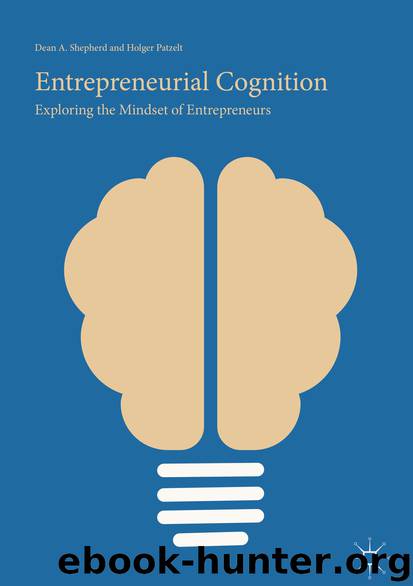Entrepreneurial Cognition by Dean A Shepherd & Holger Patzelt

Author:Dean A Shepherd & Holger Patzelt [Shepherd, Dean A & Patzelt, Holger]
Language: eng
Format: epub
ISBN: 9783319717814
Publisher: Springer International Publishing, Cham
Published: 0101-01-01T00:00:00+00:00
The Identity Distinctiveness of Entrepreneurial Individuals
An entrepreneurial role generally enables people to meet their distinctiveness need in ways that are in line with the theoretical and empirical findings discussed above. This role provides people with autonomy (e.g. Akande 1994; Boyd and Gumpert 1983; Kuratko and Hodgetts 1995) that enables them to have more influence in their venture’s development and, more generally, more control over their lives (Kolvereid 1996; Longenecker et al. 1988). Entrepreneurs can situate their ventures in relation to other ventures (and maybe even other entrepreneurs) in a way that maximizes distinctiveness (Guth and Ginsberg 1991; Lumpkin and Dess 1996; Naman and Slevin 1993), and they can build hurdles to imitation that help uphold their own and their venture’s distinctiveness (Yip 1982). Although a conventional strategy view would see such behavior as competitive maneuvering and the attempt to enhance one’s position in the market, social identity theory suggests that these behaviors also differentiate entrepreneurs from a potential “out-group.” This differentiation increases entrepreneurs’ notion of the self as being something that is different and unique (Teal and Carroll 1999).
Moreover, compared to more traditional careers , the “freedom” associated with an entrepreneurial role provides a great deal of control over and feedback for the advancement of one’s self-identity. In other words, the distinctiveness characteristic of the entrepreneurial process, together with the array of actions and behaviors individuals undertake to meet entrepreneurial ends (e.g., creating a new venture, exploiting a new opportunity ), offers these people a range of possibilities to distinguish themselves from other people. Narratives of new venture founders illustrated that some people see “the enterprise in terms of personal growth or fulfillment.” Such people believe that “life would not have been complete without proving one had the ability to successfully start a business” (Bruno et al. 1992: 297). In addition, Cova and Svanfeldt (1993) contended that some business founders “create a product that flows from their own internal desires and needs. They create primarily to express subjective conceptions of beauty, emotion , or some aesthetic ideal” (297). Overall, entrepreneurs appear to have substantial opportunities to undertake differentiation activities that align well with their desire to fulfill their need for a unique notion of self .
Scholars have been particularly interested in what makes entrepreneurs distinct from other individuals. Teachers of entrepreneurship classes tend to center their instruction on teaching students to “think outside the box” or to “color outside the lines” since most believe these actions will lead to success in the entrepreneurial context. Researchers explore how entrepreneurs are different from others in terms of their knowledge (Shane 2000), personality (Korunka et al. 2003), motivation (Naffziger et al. 1994), and cognition (Busenitz and Barney 1997). Given our interest in difference as being essential to entrepreneurial behavior and action (and constituting the basis for entrepreneurs’ fulfillment of their distinctiveness needs), it is crucial to concurrently think about existing studies suggesting that when individuals distinguish themselves as entrepreneurs, they may not be fulfilling their belongingness needs. In turn, these unmet feelings for belongingness can ultimately diminish individuals’ psychological health .
Download
This site does not store any files on its server. We only index and link to content provided by other sites. Please contact the content providers to delete copyright contents if any and email us, we'll remove relevant links or contents immediately.
The Art of Thinking Clearly by Rolf Dobelli(10489)
Mindhunter: Inside the FBI's Elite Serial Crime Unit by John E. Douglas & Mark Olshaker(9344)
Change Your Questions, Change Your Life by Marilee Adams(7783)
Nudge - Improving Decisions about Health, Wealth, and Happiness by Thaler Sunstein(7709)
Mastermind: How to Think Like Sherlock Holmes by Maria Konnikova(7347)
The Power of Now: A Guide to Spiritual Enlightenment by Eckhart Tolle(5784)
Men In Love by Nancy Friday(5240)
Altered Sensations by David Pantalony(5105)
Factfulness: Ten Reasons We're Wrong About the World – and Why Things Are Better Than You Think by Hans Rosling(4742)
The Confidence Code by Katty Kay(4264)
Thinking in Bets by Annie Duke(4227)
Man and His Symbols by Carl Gustav Jung(4137)
The Worm at the Core by Sheldon Solomon(3487)
Why Buddhism is True by Robert Wright(3454)
Liar's Poker by Michael Lewis(3450)
Three Women by Lisa Taddeo(3434)
The Inner Life of Animals by Peter Wohlleben(3319)
Descartes' Error by Antonio Damasio(3279)
How Music Works by David Byrne(3272)
